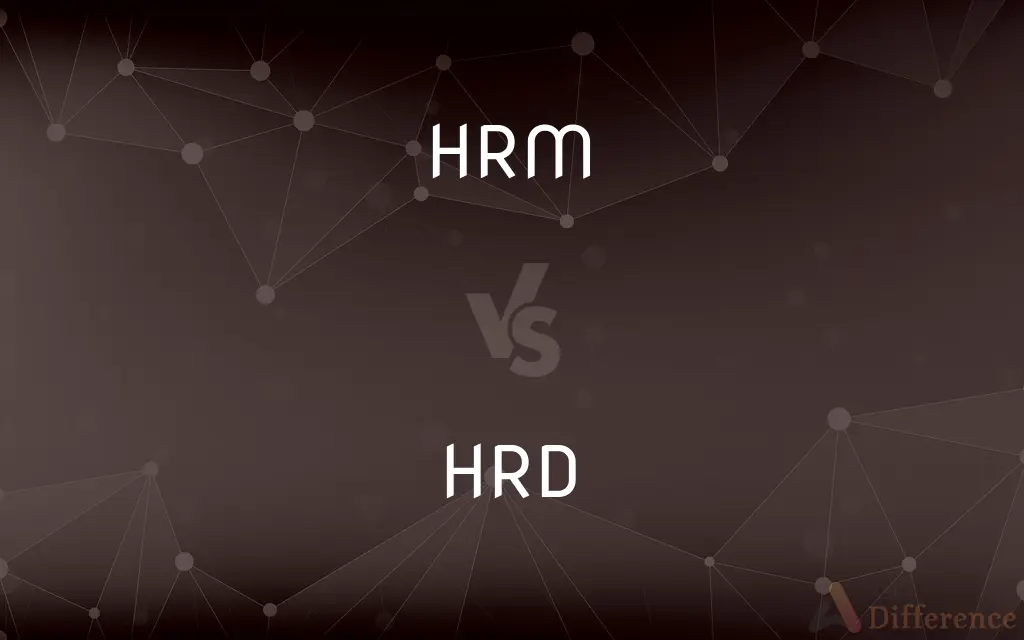HRM vs. HRD — What's the Difference?
By Tayyaba Rehman — Published on October 20, 2023
HRM (Human Resource Management) focuses on managing personnel, while HRD (Human Resource Development) emphasizes employee development and training.

Difference Between HRM and HRD
Table of Contents
ADVERTISEMENT
Key Differences
HRM, denoting Human Resource Management, encapsulates processes that handle recruiting, hiring, and overall personnel management. On the other side, HRD, or Human Resource Development, zooms in more specifically on employee growth, training, and development strategies. Thus, while HRM attends to a broader spectrum of tasks, HRD concentrates on developmental aspects.
HRM not only involves hiring but also encompasses functions like compensation, benefits, and compliance with legalities. Alternatively, HRD, while under the HRM umbrella, delineates its functionalities towards learning initiatives, workforce training, and facilitating opportunities for employee skill development, veering towards long-term personnel growth.
HRM generally plays a pivotal role in managing relationships between the organization and its employees, ensuring the well-being and satisfaction of the latter. Conversely, HRD strategically crafts initiatives that aim to upgrade employee skills, knowledge, and competencies, ensuring their professional evolution aligns with organizational needs.
Effective HRM ensures that organizations are staffed adequately and legally, fostering a harmonious work environment. Whereas, HRD, although related, takes a future-oriented approach, envisaging, and preparing employees to meet future organizational, professional, and industry demands through meticulous training and development programs.
To sum up, HRM oversees the comprehensive management and administration of employees in an organization. Meanwhile, HRD zeroes in on enhancing and developing the skills and knowledge of these employees, aiding their professional journey and in turn, contributing to organizational growth and effectiveness.
ADVERTISEMENT
Comparison Chart
Abbreviation Explanation
HRM stands for Human Resource Management.
HRD stands for Human Resource Development.
Context of Use
HRM takes a holistic approach to employee management.
HRD focuses on employee development and training.
Article Use
The HRM team organized a recruitment drive.
The HRD team arranged a skill development workshop.
In Sentences
HRM addresses staffing needs.
HRD ensures staff are proficient and evolving.
Functional Focus
HRM focuses on personnel management and relations.
HRD prioritizes employee learning and growth.
Compare with Definitions
HRM
With effective HRM, the company cultivated a positive work culture.
HRD
HRD aligns employee growth with the strategic goals of the organization.
Through HRD, the staff’s evolving expertise is synchronized with company objectives.
HRD
HRD aids in employee career progression and talent management.
HRD facilitated workshops guide employee career paths effectively.
HRD
It involves structuring training programs and learning opportunities for staff.
The HRD team launched a new e-learning platform for remote training.
HRD
HRD focuses on developing and enhancing employee skills and knowledge.
HRD programs are essential for continual employee skill enhancement.
HRD
It nurtures employee potential, preparing them for future industry demands.
HRD initiatives prepared the team for upcoming industry advancements.
Common Curiosities
What is the main function of HRM?
HRM focuses on managing and overseeing all aspects of an organization's personnel.
What is HRD concentrated on?
HRD is concentrated on employee training, development, and skill enhancement.
Which department handles payroll and benefits?
The HRM department typically handles payroll and benefits administration.
Can HRM exist without HRD?
Yes, HRM can exist without HRD, but integrating HRD enhances personnel management.
Is HRD a subset of HRM?
Yes, HRD is considered a subset of HRM, focusing specifically on employee development.
Who organizes employee training sessions?
The HRD department primarily organizes employee training and development sessions.
What role does HRM play in employee relations?
HRM plays a crucial role in maintaining healthy employee relations and resolving grievances.
Can HRD influence organizational strategy?
Yes, HRD can influence organizational strategy by aligning employee development with strategic goals.
Is HRM involved in performance appraisal?
Yes, HRM is typically involved in orchestrating and sometimes conducting performance appraisals.
Is HRM responsible for compliance with employment laws?
Yes, HRM ensures that hiring, management, and employment practices comply with relevant laws.
How does HRD facilitate career development?
HRD facilitates career development through training programs, workshops, and skill enhancement initiatives.
Can HRM strategies impact organizational culture?
Absolutely, HRM strategies can significantly shape and influence the culture within an organization.
Does HRM handle recruitment processes?
Yes, HRM oversees the recruitment, selection, and hiring processes within an organization.
How does HRD contribute to organizational growth?
HRD contributes by enhancing employee skills and ensuring alignment with organizational goals.
What role does HRD play in succession planning?
HRD plays a vital role in succession planning by identifying and developing future leaders through targeted initiatives.
Share Your Discovery

Previous Comparison
BPO vs. KPO
Next Comparison
Savings vs. InvestmentAuthor Spotlight
Written by
Tayyaba RehmanTayyaba Rehman is a distinguished writer, currently serving as a primary contributor to askdifference.com. As a researcher in semantics and etymology, Tayyaba's passion for the complexity of languages and their distinctions has found a perfect home on the platform. Tayyaba delves into the intricacies of language, distinguishing between commonly confused words and phrases, thereby providing clarity for readers worldwide.
















































